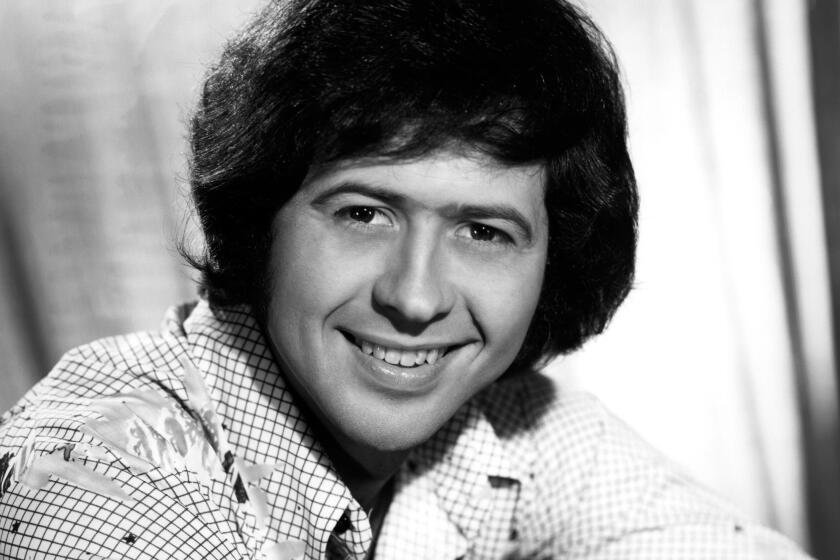A talk-show host who pursued talk, not show
Here’s a shocking revelation. People on talk shows used to talk. Not ram through gags, not blow hype smoke, not rant and shout, not reveal baby-daddies or body parts.
Talk. In normal tones of voice. About real, authentic, sometimes intimate, sometimes consequential stuff.
Yes!
Really!
Tom Snyder’s passing last week deprives us of one of the best representatives of the conversational art. This late-night great was immortal before he left us -- the cigarette smoke haze, the graying hair-helmet, the much-mocked chortle, those dead-on Dan Aykroyd “Saturday Night Live” parodies. It’s easy to overlook how Snyder proved in his 1970s NBC “Tomorrow” show and his 1990s CBS “Late Late Show” that he was one smart guy who loved to learn, discuss and debate. He actually wanted to find out something about his guests, beyond how aggressively they could shill for their latest project/product.
There isn’t much of that going on anymore. Late-night TV is all about agitation. Just when I want to wind down and chill, “celebrities” are exerting themselves to the point of hernias to “entertain” me until I double over with hilarity or sprint double-time to buy whatever they’re selling, whichever comes first. Here’s a “spontaneous” comedy bit we scripted excruciatingly! Here’s a taped gag so tightly edited, it plays as if it’s on fast-forward! Hear the studio audience shriek, jump to its feet and practically storm the stage!
Just what I want at midnight -- people desperately expending frenetic energy.
It’s a sea change that doesn’t seem likely to change back. Leno, Letterman, Kimmel, O’Brien -- they’re all after the laugh. Yet all these guys talk about Johnny Carson in reverent tones. NBC’s longtime “Tonight” host (1962-92) has practically been anointed to sainthood. Do his would-be successors think that’s because of his Mighty Carson Art Players’ goofy commercial parodies? Or his Carnac the Magnificent psychic spoof?
Johnny -- our eternally first-name pal -- was a great talk show host. He knew people. He knew when to joke, when to play it straight, when to parry with a simple show-biz personality, when to elicit actual information. He didn’t pretend to be Einstein, but he could have talked to Einstein if the physicist had still been alive. Carson hosted all sorts of important, fascinating, significant guests, including future Presidents Nixon, Reagan and Clinton. And I don’t think he asked them to squash things with steamrollers.
Not that there’s anything wrong with that. But there seems no alternative anymore, no space for honest conversation that’s also entertaining. Sure, PBS has “Charlie Rose,” in all its snooze-inducing “importance.” That’s not it. I want an entertainment show with a blend of smarts and silliness. Lighthearted banter plus sincere discussion of personally/publicly significant subjects. People truly listening and responding to each other, not reading off cards or awaiting preset cues.
One ray of hope on the horizon may be found in Snyder’s old late-late CBS slot. After the incredible lightness of ex-sportscaster Craig Kilborn, the network turned in 2005 to a Craig with considerably more heft and self-starting humor. Craig Ferguson is clever yet cerebral enough to chat with the best and brightest, being a novelist, recovering alcoholic and voracious reader in addition to a comic known for his “Drew Carey Show” stint.
Ferguson can be simultaneously hilarious and thought-provoking, as he proved in his much-discussed February monologue outlining his personal reasons for not mocking Britney Spears in the depths of her acting-out despair. He managed to make a telling point about compassion while convulsing the audience with tales of his own hideous binges and sober rebirth.
It’s not that David Letterman, Conan O’Brien, Jay Leno or even Jimmy Kimmel aren’t smart guys. They wouldn’t want us to see that, though. Whereas Ferguson actually behaves like a witty adult (most of the time), the other guys stoke the dopey adolescent in all of us. Heaven forbid they challenge their viewers. We might change channels if asked to do anything more than lap up the pap.
Of course, there’s another possibility: Some of us might actually change the channel to find something besides pap. To have our brains tickled as sharply as our funny bones. To be treated like sentient grown-ups instead of obtuse youths. Letterman actually got that, when he put Snyder behind him on CBS. After Letterman wound us up, Snyder wound us down. Once Dave convulsed the crowd, Tom connected one to one. And he never tried too hard. Heck, Snyder was such a veteran broadcaster, he didn’t “try” at all.
Maybe that’s the secret.
Diane Werts is a television critic at Newsday in New York.
More to Read
The complete guide to home viewing
Get Screen Gab for everything about the TV shows and streaming movies everyone’s talking about.
You may occasionally receive promotional content from the Los Angeles Times.






